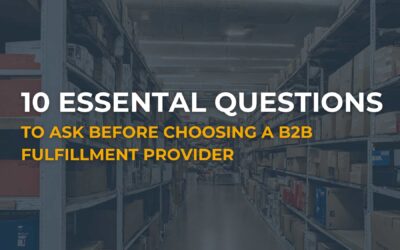
Jump Right In: 3pl Inventory Management Explained: Scale Your eCommerce Brand
In eCommerce competition is fierce and customer expectations are constantly evolving, so effective inventory management becomes a critical factor for a successful brand. It’s the backbone of operations, ensuring that businesses can meet demand without the pitfalls of overstocking or stockouts. Read on as we dive into the intricacies of 3PL Inventory Management, showing how it can serve as a cornerstone for efficiency, scalability, and customer satisfaction in eCommerce. By exploring the benefits and operational improvements offered by 3PL Inventory Management and 3PL Inventory Management Software providers, we aim to equip eCommerce sellers with the insights required for making informed decisions about their inventory management strategies.
What is 3PL Inventory Management?
3PL Inventory Management refers to the outsourcing of inventory storage, handling, and tracking operations to a third-party logistics provider. This system enables companies to optimize their supply chain efficiency and focus on their core business activities.
Understanding 3PL Inventory Management

In eCommerce, efficiency and scalability are not just goals; they’re necessities for a brand’s overall success. As businesses strive to meet the ever-increasing demands of consumers, the complexity of managing inventory grows exponentially. This is where Third-Party Logistics (3PL) comes into play, offering a lifeline to businesses navigating the turbulent waters of inventory management.
What is a 3PL?
At its core, Third-Party Logistics (3PL) refers to the outsourcing of eCommerce logistics processes to a third-party business, encompassing inventory management, warehousing, and fulfillment services. The primary role of a 3PL provider is to streamline operations for eCommerce businesses, allowing them to focus on core activities such as product development and market expansion.
The Shift Towards 3PL Services in the Digital Age
The digital age has transformed consumer expectations, placing immense pressure on businesses to deliver products faster, more reliably, and at lower costs. This seismic shift has necessitated a reevaluation of traditional inventory management practices, leading to the widespread adoption of 3PL services. By leveraging the expertise and infrastructure of 3PL providers, eCommerce businesses can achieve a level of efficiency and scalability previously unattainable.
Key Components of 3PL Services Relevant to Inventory Management
- Warehousing: 3PL providers offer comprehensive warehousing solutions, ensuring that inventory is stored safely and efficiently. This includes the management of warehouse space, security, and environmental conditions suitable for a diverse range of products.
- Inventory Management: Through sophisticated software and technologies, 3PL providers offer real-time inventory tracking and forecasting. This capability allows businesses to minimize stockouts and overstock situations, optimizing inventory levels for peak efficiency.
- Order Fulfillment: One of the most critical services offered by 3PL providers is order fulfillment. From picking and packing to shipping and returns, 3PLs handle the end-to-end process, ensuring that customers receive their orders promptly and accurately.
- Distribution: Beyond warehousing and fulfillment, 3PL providers can also manage the distribution of products to replenish FBA centers or other retail distribution centers. This often involves a mix of transportation modes and logistics strategies to achieve the best balance of cost and speed.
- Returns Management: A comprehensive 3PL service also includes the management of returns, which can be a significant pain point for many eCommerce businesses. 3PL providers streamline the returns process, making it as painless as possible for both the business and its customers.
The integration of 3PL services into eCommerce operations represents a strategic move towards enhanced efficiency, customer satisfaction, and scalability. By understanding the fundamental role and components of 3PL inventory management, eCommerce businesses can better position themselves for growth in the competitive digital marketplace.
Benefits of using a 3PL for Inventory Management
The decision to partner with a Third-Party Logistics (3PL) provider is a big decision for eCommerce brands, possibly catapulting their operational capabilities into new heights. This strategic move not only streamlines inventory management but also propels customer satisfaction and bottom-line growth. Below, we explore the many benefits of embracing 3PL for inventory management, supported by industry insights and data.

Cost Efficiency
One of the most significant advantages of using a 3PL provider is the potential for substantial cost savings. Through economies of scale, 3PL companies can offer warehousing, fulfillment, and shipping services at a fraction of the cost it would take an eCommerce brand to perform these tasks in-house. A study by the Council of Supply Chain Management Professionals (CSCMP) revealed that companies that utilize 3PL services can achieve an average logistics cost reduction of up to 11% and an average inventory cost reduction of 6%.
Enhanced Scalability and Flexibility
In eCommerce, the ability to scale operations quickly and efficiently is invaluable. 3PL providers offer scalable solutions that allow businesses to adjust their inventory management needs in response to seasonal demands, market trends, or business growth. This flexibility ensures that eCommerce brands can capitalize on market opportunities without the constraints of fixed logistics resources.
Improved Focus on Core Competencies
By outsourcing inventory management to a 3PL provider, eCommerce businesses can redirect their focus towards core activities such as product development, marketing, and customer service. This strategic reallocation of resources fosters innovation and growth, ultimately leading to a stronger competitive edge in the marketplace.
Access to Advanced Technology
3PL providers invest heavily in the latest logistics and inventory management technologies, offering eCommerce brands access to sophisticated tools for real-time inventory tracking, order management, and analytics. These technologies provide valuable insights into inventory trends, helping businesses make data-driven decisions to optimize their inventory levels and reduce costs.
Reduced Risk and Increased Reliability
Partnering with an experienced 3PL provider mitigates the risks associated with inventory management and logistics. 3PL companies have established networks, resources, and expertise to handle logistical challenges efficiently, ensuring reliable order fulfillment and distribution. This reliability strengthens the brand’s reputation and customer trust, which are critical components of eCommerce success.
Statistical Insights
According to a survey, businesses that leverage 3PL services report a 52% reduction in logistics expenses and a 26% improvement in customer service. Furthermore, a study by Armstrong & Associates highlights that 86% of Fortune 500 companies use 3PL services for logistics and supply chain management, underscoring the strategic value of 3PL partnerships for business success.
Logistics Management Software in 3PL Operations

In Third-Party Logistics (3PL), the role of logistics management software is very important. These digital solutions are the backbone of modern 3PL services, enhancing efficiency, accuracy, and client satisfaction. Here, we delve into the significance of logistics management software, the types of systems commonly used, and their roles in bolstering 3PL operations.
Importance of Logistics Management Software in 3PL
Logistics management software streamlines operations, from warehousing to distribution, making it possible for 3PL providers to handle complex logistics challenges with precision and flexibility. These tools offer real-time data, analytics, and automation capabilities that are essential for optimizing the supply chain, reducing errors, and improving decision-making.
Types of Inventory Management Software and Their Roles
- Warehouse Management Systems (WMS): WMS are pivotal in managing the storage and movement of goods within a warehouse. They ensure optimal use of space, manage inventory levels, and facilitate accurate order fulfillment. By providing detailed visibility into inventory status, location, and movement, WMS enable 3PL providers to significantly reduce errors, speed up order processing, and enhance inventory control.
- Supply Chain Management (SCM) Suites: SCM suites offer a comprehensive view of the entire supply chain, from procurement to delivery. These systems integrate various supply chain processes, providing tools for demand forecasting, supplier management, and logistics planning. SCM suites help in creating a seamless flow of information and materials across the supply chain, enabling 3PL providers to anticipate demand fluctuations, optimize inventory levels, and ensure timely deliveries.
- Enterprise Resource Planning (ERP) Systems: ERP systems integrate core business processes, including inventory and order management, accounting, human resources, and customer relationship management. For 3PL providers, ERP systems facilitate the integration of logistics operations with other business functions, ensuring a unified approach to managing business resources. This integration helps in enhancing operational efficiency, reducing costs, and improving service delivery.

How These Software Solutions Enhance 3PL Services
- Efficiency and Productivity: Automation of manual tasks reduces errors and speeds up operations, from inventory management to order processing.
- Real-Time Visibility: Access to real-time data enables 3PL providers and their clients to track inventory levels, order status, and shipment progress, improving transparency and enabling proactive decision-making.
- Scalability: As businesses grow, these software solutions can scale to meet increasing demands, supporting more complex operations and larger volumes of goods.
- Cost Reduction: Improved efficiency and accuracy lead to lower operational costs by minimizing waste, reducing stockouts or overstock situations, and optimizing labor use
- Enhanced Customer Satisfaction: Faster order processing, accurate deliveries, and the ability to provide customers with real-time information boost customer satisfaction and loyalty.
Do I Need a 3PL Yet?
Are fulfillment services the key to scaling your business efficiently? Use this simple quiz to find out! Score each of the following eight questions from 1 to 5 (where 1 = Strongly Disagree, 5 = Strongly Agree) to evaluate if a fulfillment service might be a good choice for your company.
eFulfillment Service: Specialized in eCommerce Inventory Management

Tailored Inventory Management for eCommerce Sellers
EFS offers robust inventory management solutions specifically designed for the eCommerce sector. This service includes real-time inventory tracking, which is crucial for sellers to maintain optimal stock levels, avoid overstocking or stockouts, and make informed decisions about restocking and product assortment.
Seamless FBA Prep and Amazon Warehouse Replenishment
For eCommerce merchants utilizing Amazon FBA, EFS provides specialized prep services to ensure products meet Amazon’s stringent requirements before they reach fulfillment centers. This includes quality checks, proper labeling, and packaging. Additionally, EFS’s inventory management system seamlessly integrates with Amazon’s operations, facilitating timely replenishment of stock at Amazon warehouses, thus ensuring continuous product availability and maximized sales opportunities.
Efficient B2B Distribution to Major Retailers
EFS excels in B2B fulfillment and distribution, catering to businesses that supply products to major retailers like Walmart, Target, Ulta, Costco, and more. This service is designed to handle the complexities of B2B logistics, including compliance with each retailer’s specific requirements, managing bulk shipments, and ensuring accurate and timely delivery. EFS’s expertise in this area allows eCommerce businesses to expand their reach into new markets and channels, ultimately driving growth and increasing revenue.
Why EFS’s Inventory Management Solutions Stand Out
- Customization and Flexibility: EFS understands that each eCommerce business has unique needs. Their inventory management solutions are highly customizable, ensuring they fit the specific operational requirements and growth objectives of each seller.
- Technology-Driven Efficiency: Leveraging advanced technology, EFS provides sellers with access to a sophisticated, web-based inventory management platform. This technology enables detailed tracking and management of stock levels, orders, and shipments, all in real time.
- Scalability: As businesses grow, their inventory management needs evolve. EFS’s solutions are scalable, meaning they can handle increasing order volumes and support business expansion into new markets or sales channels without the need for significant additional investment in logistics infrastructure.
Experience and Expertise: With over 20 years of experience in the logistics and fulfillment industry, EFS has developed a deep understanding of the challenges and opportunities within the eCommerce space. This expertise allows them to offer valuable insights and support to their clients, helping them to optimize their inventory management practices and achieve operational excellence.
Fulfill Orders Effortlessly!
Summary & Key Takeaways: 3PL Inventory Management Explained
In the fiercely competitive space of eCommerce, mastering inventory management is crucial for success. The journey from startup to scale-up is fraught with logistical challenges that can stump even the most astute entrepreneurs. This is where the strategic leverage of Third-Party Logistics (3PL) Inventory Management becomes a game-changer, offering a blueprint for efficiency, scalability, and enhanced customer satisfaction.
Here are the pivotal insights from our exploration of 3PL Inventory Management:
- Understanding 3PL: At its essence, 3PL involves outsourcing inventory management, warehousing, and fulfillment operations to third parties. This strategic move allows eCommerce businesses to optimize their supply chains, focus on core competencies, and navigate the complexities of scaling with expertise and technology.
- The Shift to Digital: The digital revolution has heightened consumer expectations, making swift delivery, reliability, and cost efficiency not just bonuses but expectations. 3PL services cater to these demands by offering sophisticated logistics solutions that traditional inventory management systems struggle to match.
- Benefits of 3PL: Engaging with a 3PL provider can significantly reduce logistics and inventory costs, thanks to economies of scale. It also enhances scalability and flexibility, allowing businesses to adjust to market demands without the logistical nightmares. Moreover, access to advanced technology through 3PLs provides real-time insights into inventory trends, facilitating smarter decision-making.
- Logistics Management Software: The backbone of 3PL efficiency lies in its logistics management software, encompassing Warehouse Management Systems (WMS), Supply Chain Management (SCM) Suites, and Enterprise Resource Planning (ERP) Systems. These technologies streamline operations, offer real-time data, and scale with your business growth.
- eFulfillment Service Spotlight: eFulfillment Service (EFS) emerges as a stellar example of 3PL excellence, particularly for small to medium-sized eCommerce businesses. With services ranging from inventory management to FBA prep and B2B distribution, EFS stands out for its customization, scalability, and technological prowess.




0 Comments